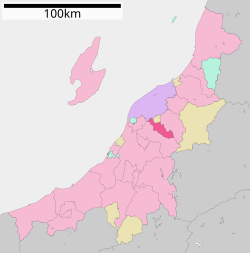Kamo, Niigata
|
Kamo 加茂市 |
|||
|---|---|---|---|
| City | |||

Kamo City Hall
|
|||
|
|||
 Location of Kamo in Niigata |
|||
| Coordinates: 37°39′58.7″N 139°2′24.8″E / 37.666306°N 139.040222°ECoordinates: 37°39′58.7″N 139°2′24.8″E / 37.666306°N 139.040222°E | |||
| Country | Japan | ||
| Region | Chūbu (Kōshin'etsu) (Hokuriku) | ||
| Prefecture | Niigata | ||
| Government | |||
| • -Mayor | Kiyohiko Koike | ||
| Area | |||
| • Total | 133.72 km2 (51.63 sq mi) | ||
| Population (June 2016) | |||
| • Total | 27,500 | ||
| • Density | 206/km2 (530/sq mi) | ||
| Time zone | Japan Standard Time (UTC+9) | ||
| Symbols | |||
| • Tree | Cryptomeria | ||
| • Flower | Camellia japonica | ||
| Phone number | 0256-52-0080 | ||
| Address | 2-3-5, Saiwai-cho, Kamo-shi, Niigata-ken 959-1392 | ||
| Website | www |
||
Kamo (加茂市 Kamo-shi?) is a city located in north-central Niigata Prefecture, in the Hokuriku region of Japan. As of 1 June 2016[update], the city had an estimated population of 27,500 and a population density of 206 persons per km². Its total area was 133.72 square kilometres (51.63 sq mi).
Kamo is located in an inland region of north-central Niigata Prefecture. As the city name implies, the Kamo River flows through the city. The highest elevation is the summit of Mount Awagatake at 1292 meters. The city roughly halfway between the two larger cities of Nagaoka and Niigata.
The area of present-day Kamo was part of ancient Echigo Province, and developed from the early Heian period as settlement associated with a branch of the Kamo Shrine in Kyoto. The modern town of Kamo was established within Kitakanbara District, Niigata with the establishment of the municipalities system on April 1, 1889. It was elevated to city status on March 10, 1954.
Kamo is traditionally associated with its production of kiri-tansu, a type of tansu chest-of-drawers made from paulownia wood.
Kamo has seven public elementary schools and five public middle schools. There are three public high schools.
Kamo maintains sister city ties with three cities:
...
Wikipedia



